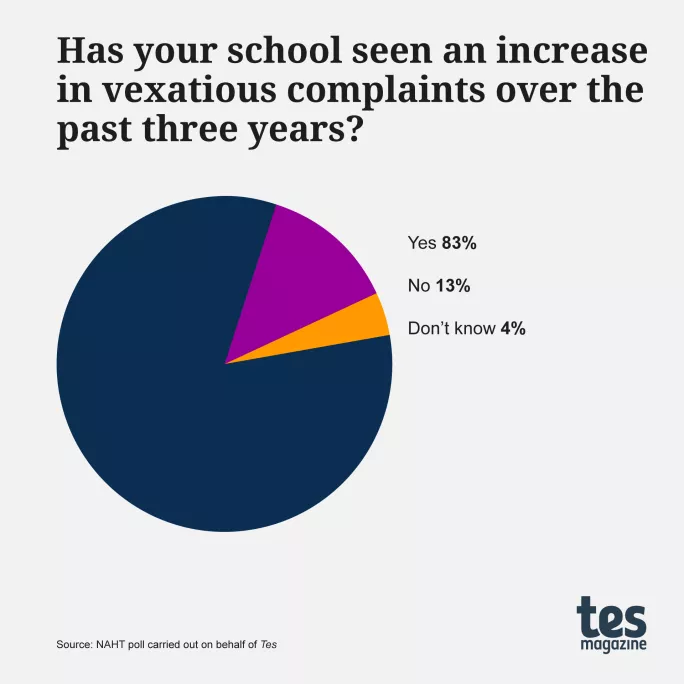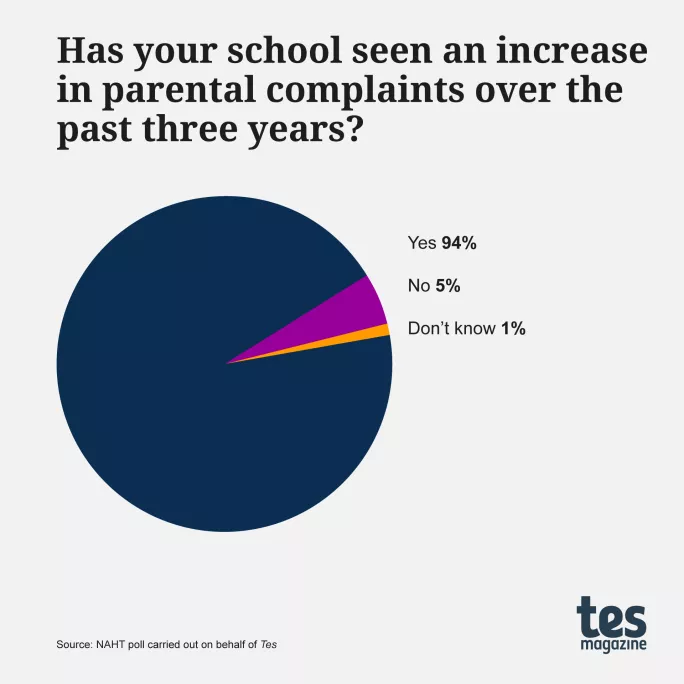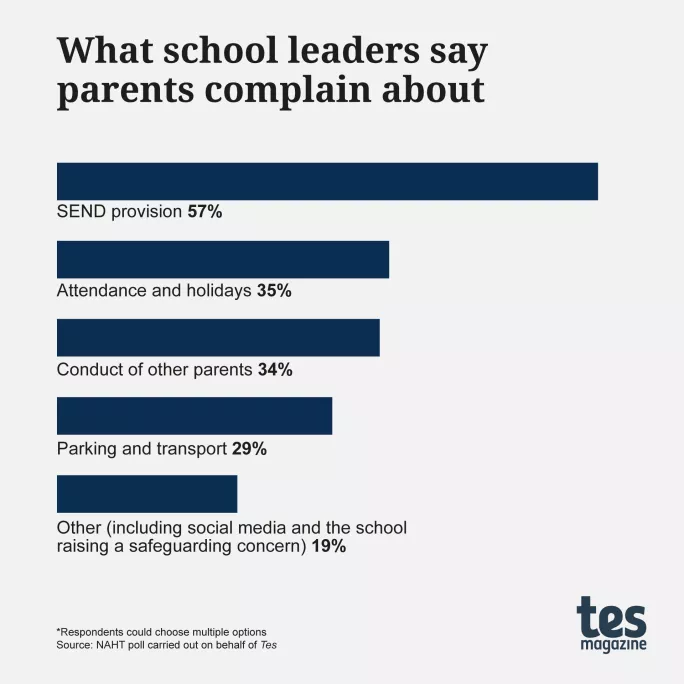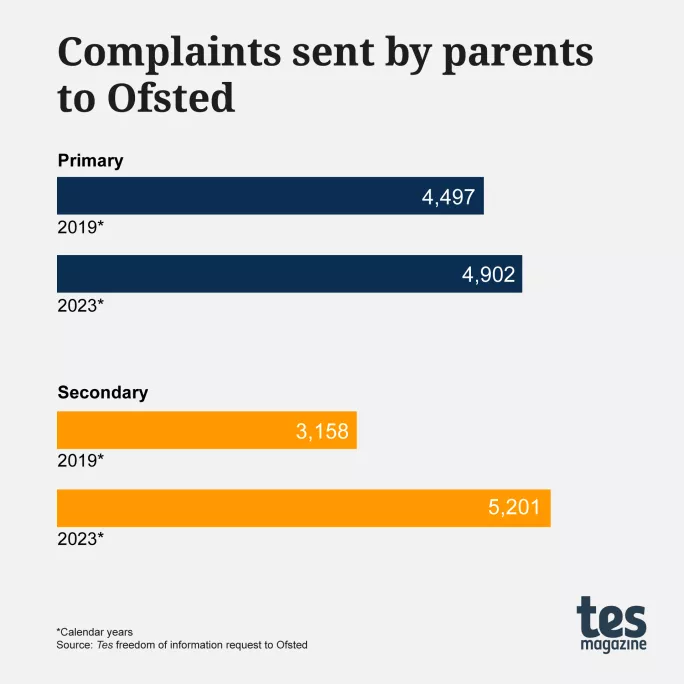Revealed: 8 in 10 school leaders see rise in vexatious complaints

More than eight in 10 school leaders are seeing an increase in vexatious complaints, creating an “unmanageable” drain on resources, a Tes investigation reveals.
The problem is being driven by social media “frenzy”, overstretched public services, rising discontent since the pandemic and the large number of different routes through which parents can complain, leaders say.
They are calling for a complete overhaul of the “Wild West” complaints system, to streamline the ways in which parents can raise grievances against schools and staff.
In a survey shared with Tes by the NAHT school leaders’ union, an overwhelming majority of leaders (94 per cent) reported an increase in parent complaints over the past three years.
Some 83 per cent said there has been a rise in “vexatious” complaints during that time.

Since 2019 there has been a 65 per cent increase in complaints from secondary school parents to Ofsted, separate data obtained from the watchdog by Tes shows.
And almost a quarter of school leaders see the number of parent complaints as “unmanageable”, a Teacher Tapp poll for Tes reveals.

Rob Tarn, chief executive officer of the Northern Education Trust, told Tes that the problem has got “quite out of hand and the situation is becoming almost untenable in some schools”.
The sheer “number of avenues to complain concurrently, together with a social media frenzy, is both upsetting and unmanageable for staff who work in schools and those that lead them”, said Mr Tarn, who is also national attendance ambassador.
And as Tes reveals the scale of the problem facing schools, the Confederation of School Trusts (CST) has today called for the Department for Education (DfE) to make urgent changes to support schools in coping with the increase in parental complaints.
Leora Cruddas, chief executive of the CST, said the volume of complaints that her members are seeing is “not sustainable” and ”will have an impact on our ability to retain our leaders”.
The rise in parent complaints
The survey of more than 1,100 school leaders, carried out by the NAHT on behalf of Tes, indicates the reasons why many parents complain to schools.
Almost six in 10 leaders (57 per cent) pointed to unmet special educational needs and disabilities provision as a reason for the growth in complaints, while more than one-third cited attendance and holidays, and the conduct of other parents (35 per cent and 34 per cent respectively).
One multi-academy trust CEO, who wished to remain anonymous, told Tes that, across their trust, behaviour policies accounted for “the highest number of complaints or concerns raised by our communities” over the past year, and ”SEND-related complaints are definitely on the increase”.
Trust leaders also point to a disintegration of public services and rising public discontent since the pandemic.
Vic Goddard, co-principal of Passmores Academy in Harlow, Essex, said his trust has faced an increase in the “vociferousness of the complaints”, rather than an increase in the number of complaints.
Parents who are angry see complaining to schools as a way for them to “get it out of their system”, he said.

While leaders are often sympathetic to the source of parents’ grievances, they feel there is more that the government could do to alleviate pressure on schools.
Schools often end up dealing with the same complaint on multiple occasions. This is because parents wishing to complain about a school can submit their grievance to numerous agencies: the Department for Education, the Education and Skills Funding Agency (ESFA), Ofsted and the Teaching Regulation Agency, as well as their MP and local media.
As a result, “the complaints system feels like the Wild West”, Mr Goddard said.
The ‘Wild West’ complaints system
One MAT CEO, who wanted to speak anonymously, said the complaints workload was a “drain on resources” at a time when school budgets were increasingly stretched.
Rob McDonough, CEO of 23-school East Midlands Education Trust, said his organisation gets “very little support from the ESFA in recognising serial complaints”, and that this agency “expects us to go through all this process time and time and time again”.
- Parent engagement: Schools face “rising tide of mistrust”
- Complaints: Families find school attendance rules “draconian”
- Exclusive: Heads’ mental health “ravaged” by Ofsted
Almost a quarter (23 per cent) of state school leaders described the number of parent complaints their school receives as “unmanageable”, according to a Teacher Tapp poll run on behalf of Tes.
One-third (33 per cent) of the state secondary leaders who responded to the poll said this was the case.
The Workload Reduction Taskforce, which was commissioned by the government to look at how to cut five hours from teachers’ working week, is set to examine parent expectations and complaints as a driver of workload ahead of making its final recommendations this spring.
In the meantime, the NAHT is seeing school complaints policies “being ignored, and complaints being escalated straight to the DfE or Ofsted”, according to assistant general secretary James Bowen.
Mr Bowen said that “one of the biggest problems” is that “the same complaints can be made to multiple agencies at the same time and schools can find themselves having to deal with the same complaint over and over again”.

The NAHT thinks that a “very simple solution” would be “to make it clear that a complaint can only be dealt with by one body at a time”.
While those complaining about schools to the DfE are asked to first go through the school’s complaints procedure and provide evidence that they have done so, many leaders are concerned that parents are bypassing the first step.
Mr Bowen said that NAHT would “like to see more being done to ensure that those making complaints have to demonstrate they have been through the school’s policy before escalating matters further”.
“The current system is not working well for anyone and needs to be reformed,” he added.
‘Unnecessary stress’ for staff
Leaders also voiced concern about the impact that the rising number of complaints is having on school staff.
Mr Bowen said that while the relationship between schools and parents is “excellent” in the majority of cases, leaders have reported a “sharp increase in vexatious and baseless complaints” in recent years.
“Dealing with these vexatious complaints is increasingly driving workload for school leaders and causing a great deal of unnecessary stress for school staff, too,” he added.
This growing concern about parent complaints comes when more than one-third of teachers and school leaders are considering quitting the sector over the next 12 months, according to a DfE survey.
One MAT CEO, speaking anonymously, told Tes that the behaviour of some parents and carers “has been unacceptable” and the trust will be implementing a “parental code of conduct”.
They added that the “external advice and support” that has been “essential in supporting...has a [financial] cost”.
Another trust CEO said it was clear that many people in the wider public “feel powerless, and that complaining about local authority figures, including schools, gives a focus for this unhappiness”.
“Schools are increasingly being asked to provide wraparound support without the resources to do so”
Last year, Ms Cruddas warned that a “decline of faith” in public institutions meant that schools “can no longer necessarily count on receiving the automatic goodwill and trust of the parents they serve”.
But she said that it was “possible to rebuild trust...by helping our young people and parents feel a sense of belonging”.
The complaints system is not working well for parents either, Jason Elsom, chief executive of Parentkind, said.
He highlighted that “more than 70 per cent of parents think their child’s school does a good job of communicating with them”, according to a national parent survey.
However, findings also indicate that when parents raise concerns about serious issues they are “generally unhappy with the support they receive, not just from school, from wider other public services”, he said.
Mr Elsom added: “There is no easy win here. Schools are increasingly being asked to provide wraparound support for children without being afforded the resources to do so.”
‘Career-threatening allegations’
One MAT CEO, speaking anonymously, told Tes they have noticed that complaints have increasingly become “personal” and are “targeting individual members of staff”.
Chris Moodie, CEO of the 23-school Diocese of Southwell and Nottingham Multi-Academy Trust, said the “overwhelming majority of concerns raised by parents and carers are entirely reasonable…[but] are often based on misconceptions, misunderstandings or miscommunications”.
He said his trust has seen a rise in “high-profile complaints” since the pandemic, which are causing several school staff to consider leaving the profession.
Mr Moodie added that “career-threatening allegations have been made that have been later found to be baseless, vexatious or simply casual”.
“For a headteacher or teacher to face this jeopardy, with no recourse for any sanction, consequence or future protection, has left colleagues feeling powerless and extremely vulnerable,” Mr Moodie said, explaining that this has led to a rise in staff absence.
“I’m sick of having to deal with unsubstantiated complaints”
He told Tes that the trust has appointed an independent complaints and code adviser (ICCA) “to reduce the time and impact of dealing with high-profile complaints” following a rise in complaints.
The ICCA deals directly with high-profile complaints, speaking with parents and carers informally before moving to a formal investigation, he explained. “If the informal stage reveals that there is no evidence for an investigation, then the process stops and parents and carers receive a full explanation,” he said.
Darren Gelder, executive principal of Grace Academy in Solihull, said that he was “sick of having to deal with unsubstantiated complaints”.
While some sectors have protection from these sorts of accusations, school leaders have to “suck it up”, he said.
Matthew Shanks, CEO of 15-school trust Education South West, told Tes that he is seeing “leaders accused of all sorts of spurious accusations”.

He said he had never before experienced this volume of parent complaints and he does not believe that it will encourage staff to become leaders.
Increase in parent complaints to Ofsted
Meanwhile, a freedom of information request submitted to Ofsted as part of this investigation reveals a massive 65 per cent increase in the total number of complaints sent by parents to the watchdog about secondary schools post-Covid.
The number of complaints sent by parents to Ofsted about secondary schools in 2023 was 5,201, up from the 3,158 recorded in 2019.
The numbers come after Ofsted’s annual report last year showed that the inspectorate had received 14,900 separate complaints about schools, some of which came from parents.

There has also been a rise in parent complaints to Ofsted about primary schools, from 4,497 in 2019 to 4,902 in 2023, but the increase was much less pronounced, at 9 per cent.
Tes also asked the DfE and the ESFA how many parent complaints they had received in these years.
However, the DfE said it was unable to provide the information because it would exceed the cost limit for FOI requests.
A DfE spokesperson said it has published best practice guidance for school complaints procedures.
You need a Tes subscription to read this article
Subscribe now to read this article and get other subscriber-only content:
- Unlimited access to all Tes magazine content
- Exclusive subscriber-only stories
- Award-winning email newsletters
Already a subscriber? Log in
You need a subscription to read this article
Subscribe now to read this article and get other subscriber-only content, including:
- Unlimited access to all Tes magazine content
- Exclusive subscriber-only stories
- Award-winning email newsletters
topics in this article



